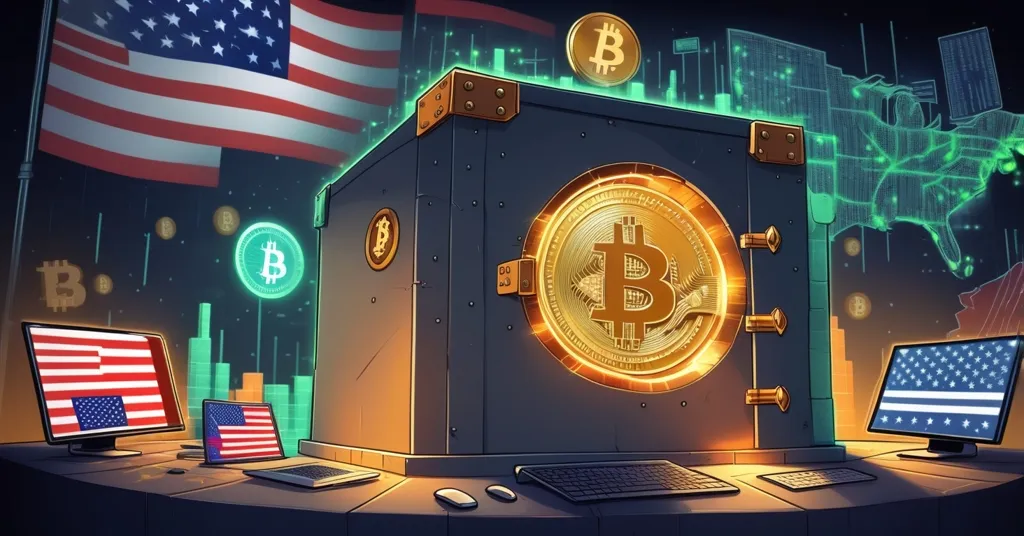US Treasury Explores Bitcoin Custody Options Amid Strategic Reserve Expansion

US Treasury Explores Custody Options for Strategic Bitcoin Reserve
The US Treasury is exploring options for securing its strategic Bitcoin reserve, which currently holds nearly 200,000 BTC valued at around $17.5 billion. Discussions with top cryptocurrency custody companies are underway to determine whether the government should self-custody its Bitcoin or utilize third-party custody services. This marks a significant shift from the previous administration’s hostility towards crypto, with President Donald Trump’s executive order signaling a pro-crypto stance.
- US Treasury discusses custody options for strategic Bitcoin reserve
- Nearly 200,000 BTC valued at $17.5 billion
- Shift from Biden’s hostility to Trump’s pro-crypto stance
Under the guidance of Trump’s AI and crypto czar, David Sacks, the Treasury is not only maintaining but also exploring ways to expand the reserve while adhering to a budget-neutral strategy. Sacks, who has dubbed the reserve a “digital Fort Knox for digital gold,” is overseeing a comprehensive audit of the federal government’s cryptocurrency holdings. This initiative follows Trump’s executive order directing both the Treasury and Commerce Department to investigate increasing the nation’s Bitcoin holdings without incurring additional costs to taxpayers.
The shift in policy has not gone unnoticed on the global stage. At a conference in Singapore, Binance CEO Richard Teng remarked, “We’ve gone from a period of regulatory hostility to one where the world’s largest economy is saying, ‘We want to embrace crypto.’” This positive sentiment is mirrored by improved banking relationships for crypto companies, reversing the impact of the Biden administration’s “Operation Choke Point 2.0,” which had previously restricted their access to financial services.
“The Treasury Department is asking all the right questions,” said Nathan McCauley, CEO of Anchorage. “They understand that this is historic.”
While optimism abounds, it’s essential to address the challenges. Bitcoin’s notorious volatility means the reserve’s value can fluctuate wildly, impacting plans to fund its expansion through mechanisms like Bitcoin bonds. Additionally, revaluing gold reserves to bolster the SBR could introduce inflationary risks, a delicate balance the government must navigate.
As the US government delves deeper into the crypto arena, ethical considerations come into play. David Sacks divested over $200 million in digital asset-related investments before his appointment, showcasing a commitment to avoiding conflicts of interest—a commendable move but also a reminder of the complexities involved in managing such a high-stakes reserve.
“It’s a real shame that we didn’t maximize value for the American taxpayer,” David Sacks said. Sacks called the SBR a “digital Fort Knox for digital gold.”
The Treasury’s discussions with firms like Anchorage and Coinbase are closely watched worldwide. The formation of the President’s Working Group on Digital Asset Markets, chaired by Sacks, signals a comprehensive approach to shaping future crypto regulations. This group’s efforts will be crucial in navigating the delicate balance between fostering innovation and ensuring stability and security in the crypto space.
“Banks are now more comfortable working with crypto clients,” said Deng, CEO of Hashkey Capital. “That’s a huge step for the crypto and Web3 industry.”
The journey of the strategic Bitcoin reserve is emblematic of the evolving landscape of cryptocurrency, where the promise of digital gold meets the realities of regulatory and financial complexities. As the US charts this new territory, the global crypto community remains hopeful yet vigilant, eager to see how this historic move unfolds.
Key Takeaways and Questions
- What is the current size and value of the US strategic Bitcoin reserve?
The reserve holds nearly 200,000 BTC, valued at around $17.5 billion.
- How has the Trump administration’s approach to cryptocurrency differed from the Biden administration?
The Trump administration has adopted a pro-crypto stance, issuing an executive order to explore increasing Bitcoin holdings, in contrast to the Biden administration’s regulatory crackdowns.
- What are the ongoing discussions between the US Treasury and crypto custody firms about?
The discussions focus on determining whether the government should self-custody its Bitcoin or use third-party custody services.
- Who is overseeing the strategic Bitcoin reserve for the Trump administration?
David Sacks, Trump’s AI and crypto czar, is overseeing the strategic Bitcoin reserve.
- How has the change in US crypto policy impacted banking relationships for crypto companies?
The new policy has led to improved banking access for crypto companies, reversing the effects of Biden’s “Operation Choke Point 2.0.”
- What global reactions have been observed in response to the US’s new crypto policy?
Global regulators and industry leaders, such as Binance CEO Richard Teng, have noted the significant shift from regulatory hostility to a pro-crypto stance by the US, viewing it as a positive development for the industry.



